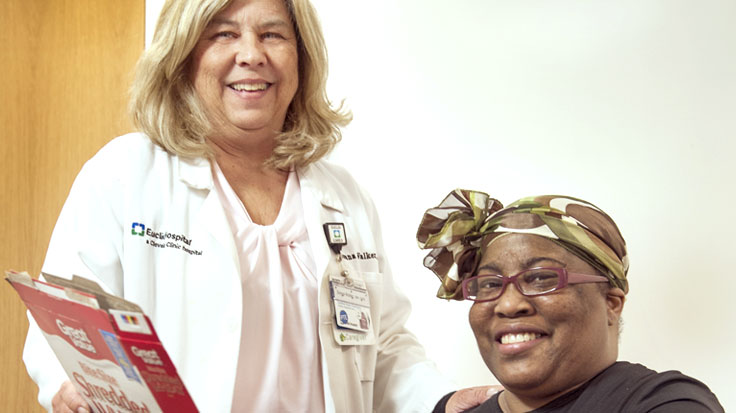
More than 10 years ago, Cleveland Clinic began offering shared medical appointments (SMAs) to patients with common chronic health conditions such as diabetes, asthma and high blood pressure.
Over the years, areas of focus for SMAs have expanded. Now, more than 100 are offered across the Cleveland Clinic system. These range from SMAs for patients with chronic conditions (such as diabetes or heart failure) to wellness SMAs (for patients who have completed treatment for breast or prostate cancer, for example).
Patients can benefit from shared medical appointments in a variety of ways, including:
- Extended time with physicians and other healthcare professionals
- Insight and knowledge gained from interacting with others with similar conditions
- A decrease in recurrence of their condition
- Reduced use of pain medications
- Fewer readmissions to the hospital
Reducing hospital readmission rates was one of the main reasons that Donna Walker, a certified nurse practitioner at Euclid Hospital, sought information on bringing chronic heart failure SMAs to Euclid’s patients. “I read an article in the Journal of the American Medical Association. It detailed how heart failure patients seen by a health professional within five to seven days of discharge from the hospital were less likely to be readmitted than patients whose follow-up visit did not take place until a month after discharge,” Donna says.
“The group sessions make you realize you’re not the only one dealing with these problems."
Data collected over time reflected that many Euclid Hospital patients did not necessarily follow the instructions provided when they were discharged to maintain better health. In addition, there was a high “noshow” rate for follow-up appointments. “Our patients just didn’t understand the importance of receiving routine follow-up care,” says Donna.
Since Euclid Hospital launched the chronic heart failure SMAs nearly three years ago, the readmission rate for patients who participate in them has dropped to just 5 percent within 30 days of being discharged from the hospital. In contrast, the readmission rate is 23 percent for those who do not participate in the SMAs.
Angela Morris, a 53-year-old Euclid resident, is one of those success stories. Diagnosed with a variety of chronic conditions — including hypertension, kidney disease, lupus, COPD and asthma — along with a family history of stroke, doctors told her she also had suffered a heart attack at some point in the past.
“My pulmonology (lung) and nephrology (kidney) physicians referred me to the SMA,” says Angela. “I’ve been coming once a month for the past six months. At each session, they do lab work, check my kidney function and send results back to my physicians.
“The group sessions make you realize you’re not the only one dealing with these problems. It’s also a great way to learn how others are able to overcome various issues. I can even call ahead to let them know if there is something I want to be sure we discuss at the next appointment.”
According to Angela, the greatest benefit she’s received from the SMAs has been help with changing her diet to one that is heart-healthy. “This was a really big thing for me — when I was in pulmonary rehab, they told me I needed to take weight off, which would help me to breathe better,” she says.
Despite taking steroid medications to treat her lupus, she’s gradually losing weight. She recently achieved her goal of losing 10 pounds over a two-month period.
Related Institutes: Wellness & Preventive Medicine, Respiratory Institute, Glickman Urological & Kidney Institute

